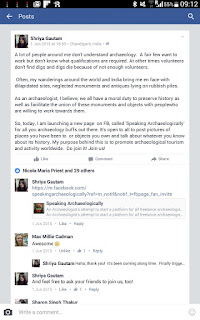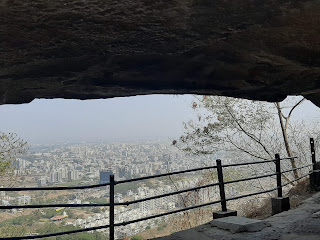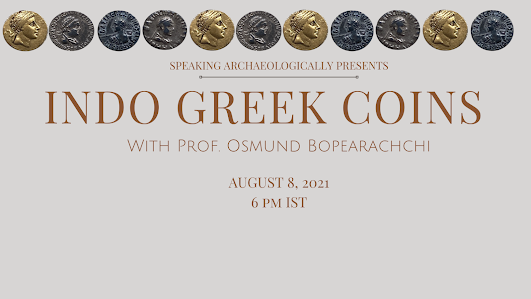Speaking Archaeologically: How it all began by Aditi Joshi
 |
| The post that changed it all! |
An idea is all that is needed to seed great works. One such idea came to be known as Speaking Archaeologically. It all started with the picture of a palace which grew into an organisation.
On a fateful day in the early months of 2015, a young girl is struck by two pictures of a palace in Himachal Pradesh (a province in the northern India) which had been in shadows for a long time. Upon her mother's suggestion, these pictures were posted on social media Facebook.
However, what happened next was unanticipated. The pictures not only received an overwhelming response from people all over the globe but there were also requests flooding in with people sharing their pictures of lost/unacknowledged heritages.
As it was to be, this young person decided to launch a platform for all freelance archaeologists. This is no one but our very own Shriya Gautam. With backing from Lyn Pease, Molly Lockeyear, Catherine Holtham-Oakley and Max Zeronian-Dalley, this idea became what we now call Speaking Archaeologically.
On June 1, 2015, Speaking Archaeologically came to be officially launched on Facebook. The first unofficial
logo of Speaking Archaeologically was a shard of Pevensey Ware pottery (circa third century Roman Britain) until it was replaced by the official logo in January 2016 (created by one of the volunteers Tarannum Caur). As explained by Max "Forgotten History is Forgotten Culture" and stands as the motto of the organisation.
 |
| Unofficial Logo |
The platform sought to recruit people from all walks of life who were in any way interested in archaeology but were pulled down by the lack of opportunities. These soon came to be served in a platter (all thanks to Speaking Archaeologically). As it turned out, people turned to the organisation with open arms. Due to the lack of resources, information and knowledge, many sites and cultures eventually came to be sheltered in the shadows of oblivion.
Thus began the whole movement to revive the lost history. Surprisingly, many objects, (which official authorities believed had no parallel source) saw their parallel objects been brought to light which opened new avenues of research and further expanded the whole base of Speaking Archaeologically. Its popularity among the people is evident from the growing membership of this platform.
What began as an idea was now fast becoming a solid foundation for helping out aspiring archaeologists. This led to another idea of spreading this idea to youngsters in colleges. The response can be judged by the number of volunteers that the organisation boasts of.
Speaking Archaeologically is not just a platform for the volunteers. It is a part of their lives now. From individual tasks, partnership tasks, group tasks, site visits, season meets, workshops, the terrifying evaluations and the results - the volunteers can now show off their considerable command over the subject.
As it celebrates its first anniversary, looking back at its journey overwhelms the Panel. Speaking Archaeologically has grown from an idea to an able platform for guiding the young minds, to aid them to quench their thirst for the unknown history and to prevent "forgotten history" from becoming "forgotten culture".
 |
| Official Logo |
Thus began the whole movement to revive the lost history. Surprisingly, many objects, (which official authorities believed had no parallel source) saw their parallel objects been brought to light which opened new avenues of research and further expanded the whole base of Speaking Archaeologically. Its popularity among the people is evident from the growing membership of this platform.
What began as an idea was now fast becoming a solid foundation for helping out aspiring archaeologists. This led to another idea of spreading this idea to youngsters in colleges. The response can be judged by the number of volunteers that the organisation boasts of.
Speaking Archaeologically is not just a platform for the volunteers. It is a part of their lives now. From individual tasks, partnership tasks, group tasks, site visits, season meets, workshops, the terrifying evaluations and the results - the volunteers can now show off their considerable command over the subject.
 |
| The Volunteers at Coinage Workshop |
Providing the platform was one of the aims of Speaking Archaeologically. However, "it is not about the destination; it is about the journey to get there".This thought, more than anything, gives birth to this blog.
The research and observations brought forward by the organisation are the technical aspects but the blog is the emotional journey of the organisation and all those connected with it. And the Journey is, more often, better than the Destination!



Comments
Post a Comment